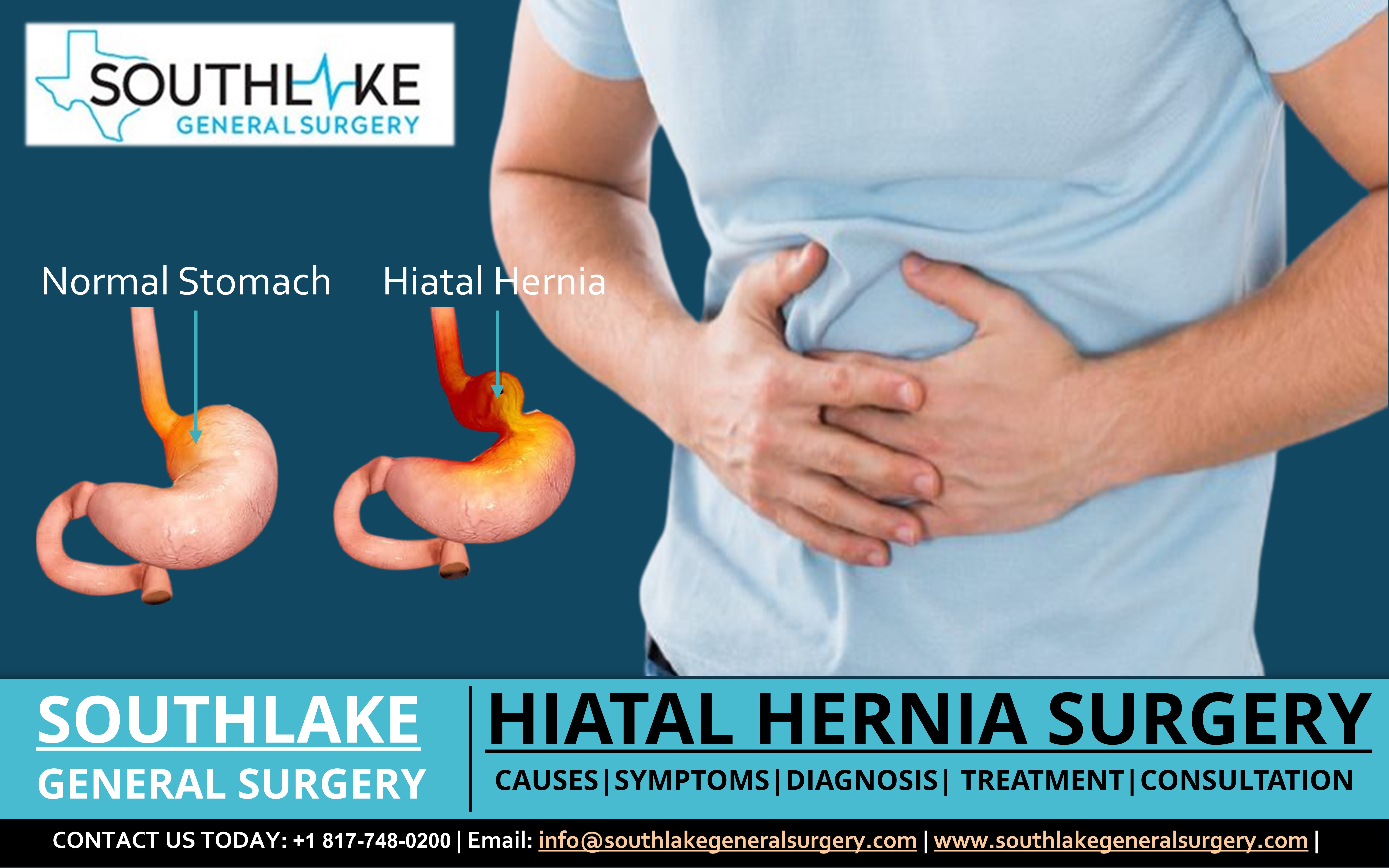A hiatal hernia is a condition when an upper section of the stomach stretches out up through the diaphragm and into the chest region. This condition may develop severe symptoms of acid reflux or GERD and through medicines, these symptoms can be treated. In case, medicines don’t work, your doctor may suggest hernia surgery as a treatment.
What does a hiatal hernia procedure do?
Hernia Repair Surgery at Southlake General Surgery, Texas is conducted by the experienced board-certified general surgeon Dr. Valeria Simone MD.
In a hiatal hernia surgery, the surgeon pulls the stomach toward the abdomen and makes the aperture in the diaphragm smaller. This surgery can also include surgical reconstruction of the esophageal sphincter or removal of the hernial pockets.
People who don’t have any symptoms of hiatal hernia may not require hernia repair surgery. Hernia surgery is recommended for individuals with severe conditions that haven’t responded to the medicines.
If an individual has severe symptoms of a hernia, then hernia surgery is always recommended as an option. The following are the symptoms of a hiatal hernia:
- Wound scarring
- bleeding
- sores
- constriction of the esophagus
How to prepare for a hiatal hernia surgery?
Your brief you about the surgery guidelines and its procedure. You need to follow your doctor’s instructions to avoid any complications at the surgery. Preparation of the surgery includes:
- Breathing exercise multiple times, a day
- Walking for about 20-30 minutes
- Avoid taking blood-thinning and nonsteroidal anti-inflammatories (NSAIDs) medicines a week prior to the surgery
- Don’t smoke at least 4 weeks prior to the surgery
- Don’t eat or drink at least 12 hours in advance of surgery
How does a hiatus hernia surgery work?
Your doctor will inform you about the type of hiatal hernia surgery procedure and it can be one of these: Open hernia repair surgery, Laparoscopic hernia surgery, and endoluminal fundoplication. In all these surgeries the doctor uses general anesthesia and the duration of the surgery is about 2-3 hours.
Open Hernia Repair Surgery or Open surgery
In this surgical procedure, the surgeon makes one large incision in the abdomen to access the hernia. This surgery is a more invasive surgery and once the surgery is completed the surgeon closes the surgical site with sutures. Recovery time in this procedure is a little longer as compared to laparoscopic surgery.
Laparoscopic Hernia Surgery
In this procedure, the doctor makes 3-5 small incisions in the abdomen to insert the special surgical instruments and the laparoscope. The surgeon pulls the stomach towards the abdomen where it belongs. Then the surgeon wraps the upper portion of the stomach around the bottom part of the esophagus, which makes a tighter sphincter to prevent acid reflux from happening. In laparoscopic surgery, there is always a low risk of infection due to a less invasive procedure and recovery time is less. The patient can discharge from the hospital the same day after the surgery.
Endoluminal fundoplication
Endoluminal fundoplication is another procedure, and it is the least invasive method to treat a hernia. In this procedure, the doctor doesn’t need to make any incision rather they will insert an endoscope with a small camera on the top through your mouth and slide it down to the esophagus. The surgeon will put the tiny clips in the spot where the stomach joins the esophagus. It is important to put these clips to forestall stomach acid and food from upholding into the esophagus.
Recovery Process After Hernia Surgery
During your recovery after surgery, the doctor will share detailed instructions about your medicines, diet plan, exercises you can do, and so on. After surgery, few people may experience burning pain or tingling sensation near the surgical site, these sensations are temporary. Follow your doctor’s guidelines on medicines and diet soon it will get better.
After hernia surgery, the patient needs to clean the incision site with gentle soap and water. It is recommended to avoid summing, hot tubs and adhere to the shower. Take 5-6 small meals in your diet plan every day instead of one or two large meals. Begin with a liquid diet and gradually shift to a soft diet such as vegetable soup, mashed potatoes, and so on.
After surgery avoids the following:
- Use of straw for drinking
- Avoid food that can develop gas like beans, citrus, cauliflower, tomato products, etc.
- carbonated drinks and alcohol
- smoking
Please adhere to the doctor’s instructions for a speedy recovery. Your doctor will probably suggest you some coughing and breathing exercises to strengthen the diaphragm. Please follow the instructions for exercises as advised by the doctor to avoid any complications.
Recovery Time After Hernia Surgery
Complete recovery after hernia surgery may take 10-12 weeks. Under the guidance of the doctor, an individual can resume his regular activities after a few weeks of the surgery. For example, you can start walking and soft exercises as advised by the doctor. You are not allowed to lift heavy weights after surgery for few a weeks to speed up the healing process.
Takeaway
When your recovery time is completed and symptoms like acid reflux and nausea have reduced or completely healed. Your doctor may advise staying away from foods and beverages that cause GERD problems, like carbonated drinks, acidic foods, alcohol, or smoking.
Appointments
For more information on a hiatal hernia causes, symptoms, diagnosis, treatment, or consultation. Please contact our healthcare expert today at +1 (817) 748-0200. You can also make an online appointment with us.
Follow us on Facebook.

